Building on a Solid Foundation
By: Dan Schaefer, P.E. (Froehling & Robertson, Inc.)
I was born and raised in Rochester, New York. After reading the children’s book  “Who Built the Highway” at an early age, I was hooked and knew that somehow, someway, I was going to be involved in construction. For my seventh birthday, I had been lobbying hard to get a sandbox and some Tonka toys. As it turned out, my dad had a friend in the sand and gravel business, and he had a dump truck full of sand delivered to our house and about half of our backyard became my sandbox. This quickly became a neighborhood gathering spot where my friends and I (and even some parents) spent endless days playing and building. As I got older, I helped out in my father’s law office during school vacations, but preferred to walk around the city and watch the different construction projects rise up out of the ground.
“Who Built the Highway” at an early age, I was hooked and knew that somehow, someway, I was going to be involved in construction. For my seventh birthday, I had been lobbying hard to get a sandbox and some Tonka toys. As it turned out, my dad had a friend in the sand and gravel business, and he had a dump truck full of sand delivered to our house and about half of our backyard became my sandbox. This quickly became a neighborhood gathering spot where my friends and I (and even some parents) spent endless days playing and building. As I got older, I helped out in my father’s law office during school vacations, but preferred to walk around the city and watch the different construction projects rise up out of the ground.
Another defining part of my youth was spending most summers in Canada, either at my grandparents’ summer house on an island in the St. Lawrence River, or at a wilderness canoe tripping camp in Algonquin Provincial 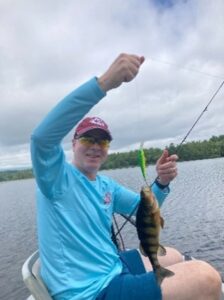 Park that I attended as a youth and also worked at as a counselor into my college years. My summers were filled with fishing, hiking, swimming, sailing, canoeing, camping, and many other outdoor activities with friends and family. I reflect on these summers all the time and how fortunate I was to have this opportunity and freedom to explore.
Park that I attended as a youth and also worked at as a counselor into my college years. My summers were filled with fishing, hiking, swimming, sailing, canoeing, camping, and many other outdoor activities with friends and family. I reflect on these summers all the time and how fortunate I was to have this opportunity and freedom to explore.
In high school, I excelled in math and loved various shop classes, especially wood shop, where I made all sorts of household items I still see every day. However, I did not have much career aspiration and thought I might want to be a math teacher someday. That was until one of my father’s clients, who owned a pre-cast concrete company, asked me what I like to do. I told him I liked construction, the outdoors and math, and he suggested I seriously consider studying civil engineering in college.
Next thing I knew, I was headed off to pursue a Bachelor of Science degree in civil engineering at New England College in Henniker, New Hampshire. Also at the suggestion of my father’s pre-cast concrete client, I worked as a soil and concrete testing technician at Empire Soils Investigations, Inc. in Rochester, New York during the summer of my junior year where I finally got my first chance to work on real-life construction projects and got exposure to geotechnical engineering.
After receiving my BSCE in 1985, I took a job as a staff geotechnical engineer at Empire Soils. Little did I know, I was walking into an environment rich with learning, where I would be mentored by two of the best geotechnical engineers I have come across in my career – Charlie Gaynor and Bent Thomsen. Bent was the owner of Empire Soils and actively involved with ASFE/GBA; he provided oversight and guidance to then-Executive Director John Bachner during development of the Practice Management for Design Professionals text.
During my fourth year at Empire Soils, Charlie enrolled me in one of the first ASFE Introduction to Professional Practice (IPP) courses, which were later renamed Fundamentals of Professional Practice (FOPP). The IPP class opened my eyes to many new aspects of our profession beyond the technical aspects that I had focused on until that point.
After spending five very formative years at Empire Soils, life had some changes in store 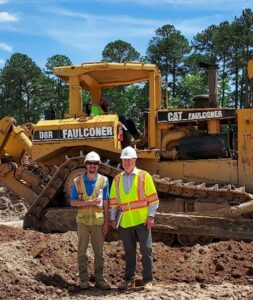 for me. My girlfriend moved to North Carolina and I made one of the best decisions of my life and quickly followed her. I started working as a geotechnical engineer for Froehling & Robertson, Inc. (F&R) in their Raleigh, North Carolina office in 1990. Not long after, my girlfriend, Soleir, became my wife and she has now endured 33 years being the wife of a geoprofessional.
for me. My girlfriend moved to North Carolina and I made one of the best decisions of my life and quickly followed her. I started working as a geotechnical engineer for Froehling & Robertson, Inc. (F&R) in their Raleigh, North Carolina office in 1990. Not long after, my girlfriend, Soleir, became my wife and she has now endured 33 years being the wife of a geoprofessional.
In 2001, ten years (and several promotions) later, I became the branch manager of F&R’s Raleigh office, taking over for Ray Whitaker, who had closely mentored me during my first decade at F&R. In 2016, I was promoted to my current position as F&R’s Carolinas Regional Vice President, where I have operation and management oversight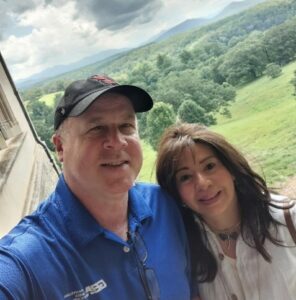 for three offices in North Carolina. This role has given me the opportunity to administer several internal and external-facing programs geared toward improving F&R’s business practice. During my early years at F&R,
for three offices in North Carolina. This role has given me the opportunity to administer several internal and external-facing programs geared toward improving F&R’s business practice. During my early years at F&R,
I was able to complete a master’s degree in civil engineering from North Carolina State University and have become a devoted Wolfpack fan.
During my 38-year career, I have been fortunate to receive close mentoring and be involved with all sorts of construction projects. I have honed my skills in geotechnical engineering, construction inspection and materials testing, and even some environmental consulting. In addition to my management duties, I continue to serve as a senior engineer on a wide variety of site development, building, and 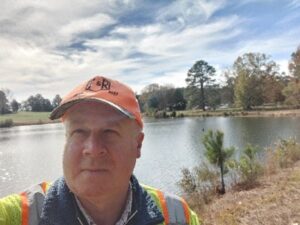 transportation projects with particular emphasis in foundation, retaining wall, pavement, and slope design. I feel fortunate to have been exposed to ASFE/GBA at a very early age and have been actively involved with GBA for almost 20 years now.
transportation projects with particular emphasis in foundation, retaining wall, pavement, and slope design. I feel fortunate to have been exposed to ASFE/GBA at a very early age and have been actively involved with GBA for almost 20 years now.
There are many things that have contributed to my professional success, and I list my involvement with GBA as being near the top of the list. I have made lasting relationships and learned so much about how to be a better geoprofessional and provide better service to our clients through my association with GBA.
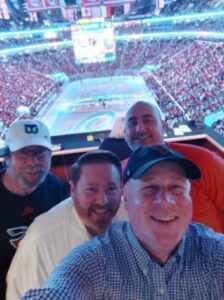 Another defining aspect of my career is having excellent mentors each step along the way who have taken the time to teach and nurture me. These positive experiences have been a catalyst for me to actively be a mentor to others, both at work and in my personal life. I was fortunate to have great mentors find me, and my advice to early professionals is to seek out and engage mentors … even if they do not find you, as was my experience. My mentors encouraged me to explore new things and coaxed me to the edge of my comfort zone, which is where you will really start to learn, grow, and develop a fulfilling career. Don’t be afraid to explore the boundaries of your knowledge.
Another defining aspect of my career is having excellent mentors each step along the way who have taken the time to teach and nurture me. These positive experiences have been a catalyst for me to actively be a mentor to others, both at work and in my personal life. I was fortunate to have great mentors find me, and my advice to early professionals is to seek out and engage mentors … even if they do not find you, as was my experience. My mentors encouraged me to explore new things and coaxed me to the edge of my comfort zone, which is where you will really start to learn, grow, and develop a fulfilling career. Don’t be afraid to explore the boundaries of your knowledge.
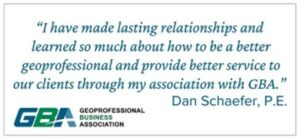
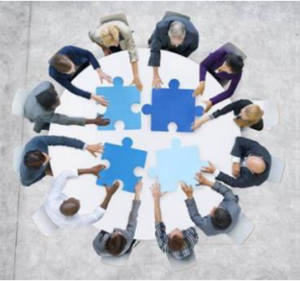 more Peer Groups for 2024, and this is your opportunity to participate.
more Peer Groups for 2024, and this is your opportunity to participate.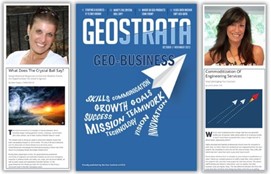 latest issue of the Geo-Institute’s
latest issue of the Geo-Institute’s 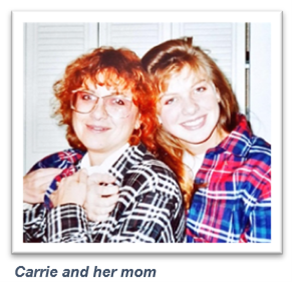 I grew up crisscrossing the West Coast from the San Francisco Bay-area to Salem, Oregon, to Fresno, California to Seattle, Washington. As I watched my single, working mom navigate the world in the ‘70s and ‘80s, I knew I could be anything I wanted to because she emulated that for me. There was never a question of if I could be a professional one day.
I grew up crisscrossing the West Coast from the San Francisco Bay-area to Salem, Oregon, to Fresno, California to Seattle, Washington. As I watched my single, working mom navigate the world in the ‘70s and ‘80s, I knew I could be anything I wanted to because she emulated that for me. There was never a question of if I could be a professional one day.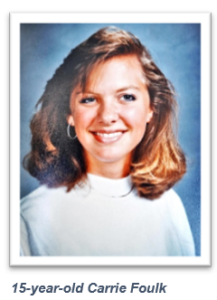
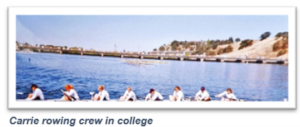 environmental engineering where we talked a lot about waste – in particular, human waste – I decided I wasn’t as interested in pursuing environmental engineering anymore and set my sights on becoming a structural engineer.
environmental engineering where we talked a lot about waste – in particular, human waste – I decided I wasn’t as interested in pursuing environmental engineering anymore and set my sights on becoming a structural engineer.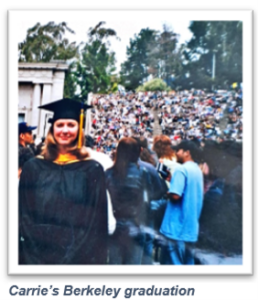 was fairly comical because they asked me two questions that I had zero answers for: 1) What’s an Atterberg limit? and 2) What’s an R-value? It had been close to five years since I had taken my geotechnical classes in college. So, I said, “I don’t remember, but I promise I’m a fast learner.” And they hired me! Our stint in New Mexico lasted only 10 months, after which we moved to the San Francisco Bay Area. I stayed with Kleinfelder and liked geotechnical engineering enough that I decided to pursue a master’s degree in the field, which I attained at Cal Berkeley.
was fairly comical because they asked me two questions that I had zero answers for: 1) What’s an Atterberg limit? and 2) What’s an R-value? It had been close to five years since I had taken my geotechnical classes in college. So, I said, “I don’t remember, but I promise I’m a fast learner.” And they hired me! Our stint in New Mexico lasted only 10 months, after which we moved to the San Francisco Bay Area. I stayed with Kleinfelder and liked geotechnical engineering enough that I decided to pursue a master’s degree in the field, which I attained at Cal Berkeley.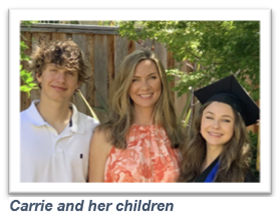
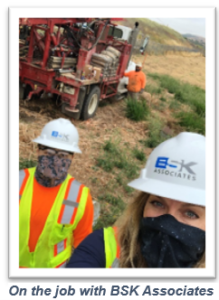 GBA Executive Director Joel Carson when he worked at Kleinfelder. He was the face to a lot of clients and he was the one who would get yelled at when things went wrong. So, he made some valuable clients through his handling of those difficult situations and that’s held true to this day:
GBA Executive Director Joel Carson when he worked at Kleinfelder. He was the face to a lot of clients and he was the one who would get yelled at when things went wrong. So, he made some valuable clients through his handling of those difficult situations and that’s held true to this day: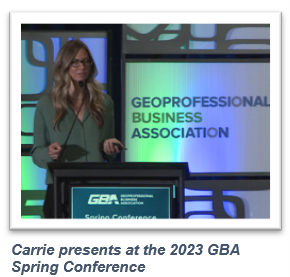
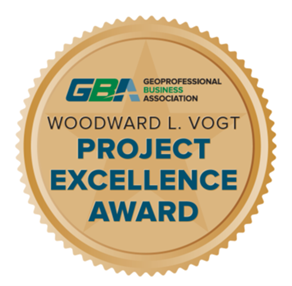 its members who live and demonstrate the vision of GBA to great accomplishment. Winners of this award will truly showcase their hard work and contributions to society in front of all their peers, clients, and other professionals from across North America.
its members who live and demonstrate the vision of GBA to great accomplishment. Winners of this award will truly showcase their hard work and contributions to society in front of all their peers, clients, and other professionals from across North America.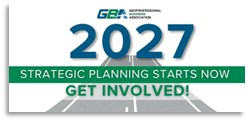 2027 and beyond. Every three years, the Directors seek input from members to review important industry trends in risk management and business optimization, evaluate member value, and identify objectives that are critical to the health and success of geoprofessional consulting firms. Their efforts culminate in the formation of a strategic plan that guides initiatives, programs, and resources to benefit our members.
2027 and beyond. Every three years, the Directors seek input from members to review important industry trends in risk management and business optimization, evaluate member value, and identify objectives that are critical to the health and success of geoprofessional consulting firms. Their efforts culminate in the formation of a strategic plan that guides initiatives, programs, and resources to benefit our members.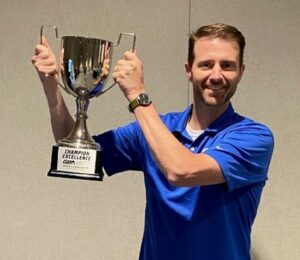 As I continue my GBA presidency, I reflect on the role GBA has played in
As I continue my GBA presidency, I reflect on the role GBA has played in 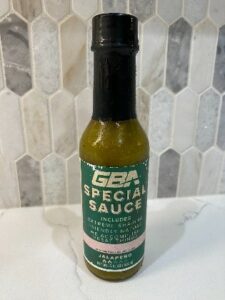 outside Denver. There, I encountered a tremendous network of fellow geoprofessionals – classmates and practitioners giving back to their profession – from across the country. I left the seminar eager to delve further into GBA so I could continue to improve my business acumen and expand my professional network. It was exactly what I was looking for at that point in my career and served as a launchpad for the next 15 years. I had a taste of the GBA “special sauce” and I was hooked and craving more.
outside Denver. There, I encountered a tremendous network of fellow geoprofessionals – classmates and practitioners giving back to their profession – from across the country. I left the seminar eager to delve further into GBA so I could continue to improve my business acumen and expand my professional network. It was exactly what I was looking for at that point in my career and served as a launchpad for the next 15 years. I had a taste of the GBA “special sauce” and I was hooked and craving more.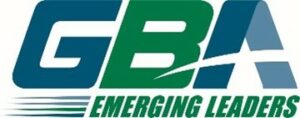 Our class members bonded quickly and with our collaborative spirit and zeal, we raised awareness on these exciting new social media tools to promote our individual businesses, and to promote the many benefits of GBA. Our Emerging Leaders Class completed its tenure after two years, after which many class members became engaged with serving on GBA’s Committees.
Our class members bonded quickly and with our collaborative spirit and zeal, we raised awareness on these exciting new social media tools to promote our individual businesses, and to promote the many benefits of GBA. Our Emerging Leaders Class completed its tenure after two years, after which many class members became engaged with serving on GBA’s Committees.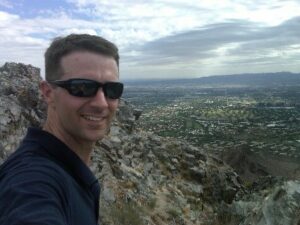 business-related subjects that directly impact our firms. I came away from each meeting with information to improve my own business practices, as well as ideas that could be implemented across S&ME.
business-related subjects that directly impact our firms. I came away from each meeting with information to improve my own business practices, as well as ideas that could be implemented across S&ME.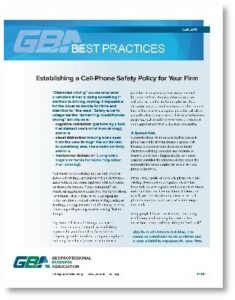 to prepare a Best Practices document on the subject (funny how that works!). I was thrilled to be able to contribute to the organization that had given me so much and play a small role in creating safer practices for geoprofessionals.
to prepare a Best Practices document on the subject (funny how that works!). I was thrilled to be able to contribute to the organization that had given me so much and play a small role in creating safer practices for geoprofessionals.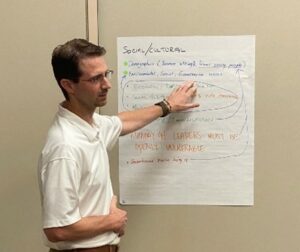
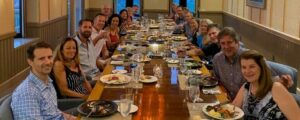
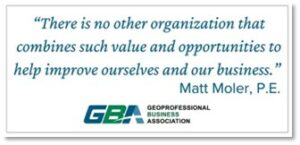 I’ve shared my GBA journey with you in the hope that it inspires you to get involved in GBA. Volunteer for leadership opportunities. Speak up and share your opinions. Meet others that are passionate like you. And try to make an impact!
I’ve shared my GBA journey with you in the hope that it inspires you to get involved in GBA. Volunteer for leadership opportunities. Speak up and share your opinions. Meet others that are passionate like you. And try to make an impact!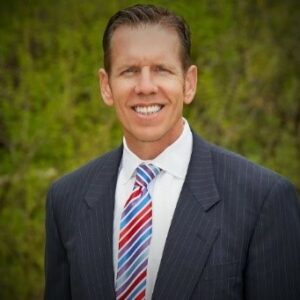 “Having worked with Matt for several years and now more regularly as he has been GBA’s President, I admire his sincerity and thoughtfulness as a leader. He makes sure everyone’s voices are heard and can build consensus on issues by bringing different perspectives together and focusing on the GBA’s strategic direction. He is also very creative as evidenced by his bringing GBA’s Special Sauce to reality, something none of us will forget. All that being said, Matt is simply someone everyone enjoys spending time with because he contributes positively in all situations.”
“Having worked with Matt for several years and now more regularly as he has been GBA’s President, I admire his sincerity and thoughtfulness as a leader. He makes sure everyone’s voices are heard and can build consensus on issues by bringing different perspectives together and focusing on the GBA’s strategic direction. He is also very creative as evidenced by his bringing GBA’s Special Sauce to reality, something none of us will forget. All that being said, Matt is simply someone everyone enjoys spending time with because he contributes positively in all situations.”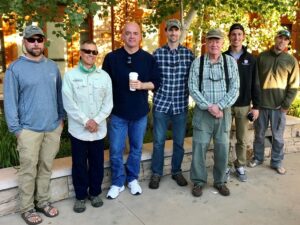
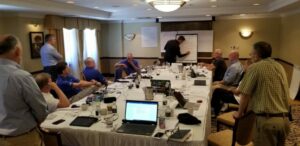
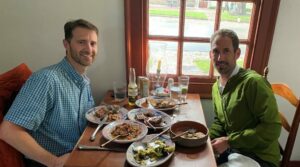
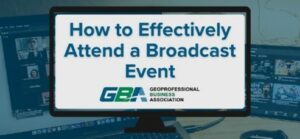 full workload, while also soaking up new information from speakers. You can keep one eye on your emails, one ear on the current conference speaker, and one foot out the door for your next on-site meeting.
full workload, while also soaking up new information from speakers. You can keep one eye on your emails, one ear on the current conference speaker, and one foot out the door for your next on-site meeting.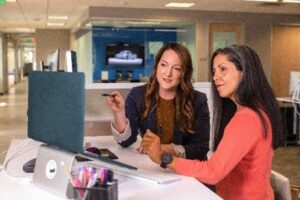 and show them the agenda. Your supervisor can help you align your event goals to your career path. They may encourage other employees to register to attend with you.
and show them the agenda. Your supervisor can help you align your event goals to your career path. They may encourage other employees to register to attend with you.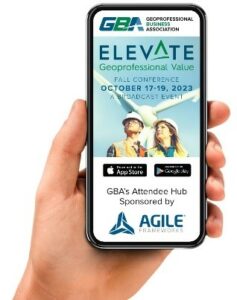 along with a link to the event’s webpage for more information. Ask event organizers if they have a graphic they can send you or if you can use the event logo to go along with your post. Not only will this help support the organization and event, but it will also make it easier to connect with others in attendance and strengthen your professional network.
along with a link to the event’s webpage for more information. Ask event organizers if they have a graphic they can send you or if you can use the event logo to go along with your post. Not only will this help support the organization and event, but it will also make it easier to connect with others in attendance and strengthen your professional network.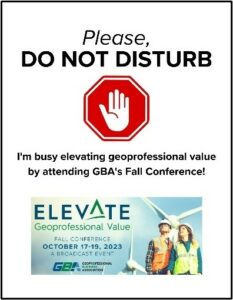
 Here’s how to do this on an
Here’s how to do this on an 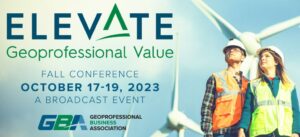 begins October 17 and it’s not too late to register!
begins October 17 and it’s not too late to register!  GBA has released an updated document designed to provide guidance to civil and structural engineers on how to communicate the value of qualified CoMET consultants to owners. When owners don’t do quality assurance right, a project’s civil and structural engineers may face just as much risk as the owner and project geoprofessionals. GBA encourages project design professionals to explore this message with information they can pass on to owners to help all parties lower their risks.
GBA has released an updated document designed to provide guidance to civil and structural engineers on how to communicate the value of qualified CoMET consultants to owners. When owners don’t do quality assurance right, a project’s civil and structural engineers may face just as much risk as the owner and project geoprofessionals. GBA encourages project design professionals to explore this message with information they can pass on to owners to help all parties lower their risks.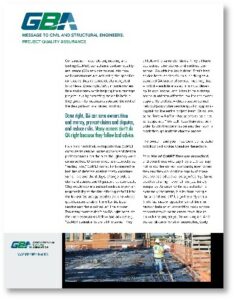
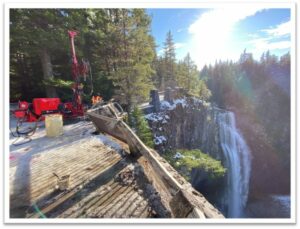
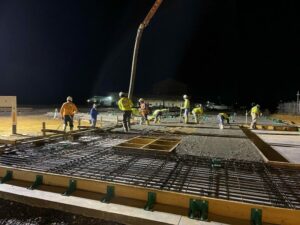
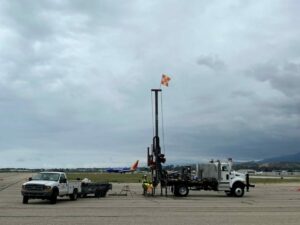
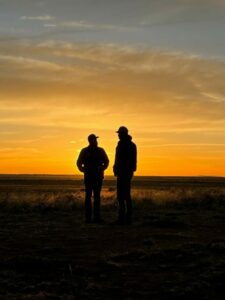
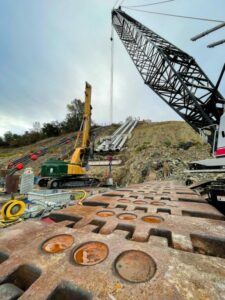
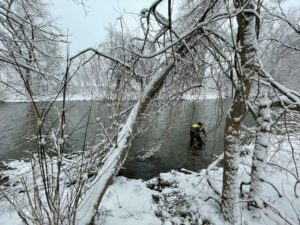


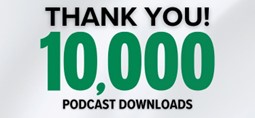 has reached a momentous milestone of 10,000 downloads. GBA podcasts present information and expertise from geoprofessionals around the globe to provide their peers with wisdom and insight to optimize their business and reduce risk.
has reached a momentous milestone of 10,000 downloads. GBA podcasts present information and expertise from geoprofessionals around the globe to provide their peers with wisdom and insight to optimize their business and reduce risk. “We created the GBA Podcast to make the educational opportunities and
“We created the GBA Podcast to make the educational opportunities and 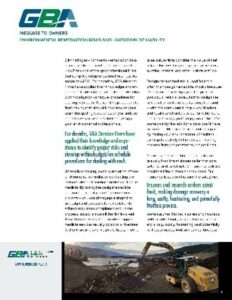 to clients for environmental services. This document explains how risk allocation is an important element of risk management, and that limitation of liability is a highly effective technique for risk allocation.
to clients for environmental services. This document explains how risk allocation is an important element of risk management, and that limitation of liability is a highly effective technique for risk allocation.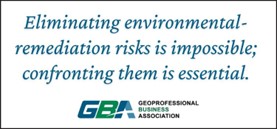 Limitation of liability is fair and reasonable, can result in lower project costs, and can encourage design excellence.
Limitation of liability is fair and reasonable, can result in lower project costs, and can encourage design excellence.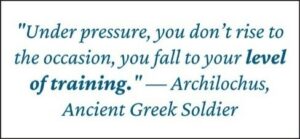
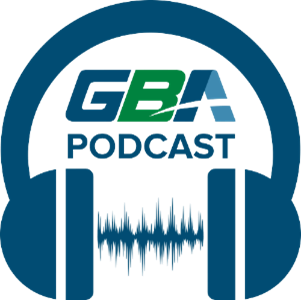 In the latest installment of the GBA Podcast – the Audio Education Series – hosts Tiffany Vorhies, NACE CIP2 (SME) and Ryan White, P.E., G.E., F.ASCE (PBS Engineering + Environmental) address some of the most challenging aspects of field representation. From navigating business relationships to forming prudent field reporting habits, this series contains helpful insights for the novice and seasoned pro.
In the latest installment of the GBA Podcast – the Audio Education Series – hosts Tiffany Vorhies, NACE CIP2 (SME) and Ryan White, P.E., G.E., F.ASCE (PBS Engineering + Environmental) address some of the most challenging aspects of field representation. From navigating business relationships to forming prudent field reporting habits, this series contains helpful insights for the novice and seasoned pro.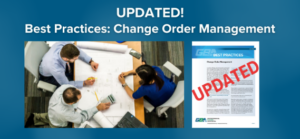 scopes result in change orders, finding it difficult to submit legitimate payment requests for legitimate services to their clients. Effective communication with your client can make or break the client-consultant relationship and affect future profitability.
scopes result in change orders, finding it difficult to submit legitimate payment requests for legitimate services to their clients. Effective communication with your client can make or break the client-consultant relationship and affect future profitability.